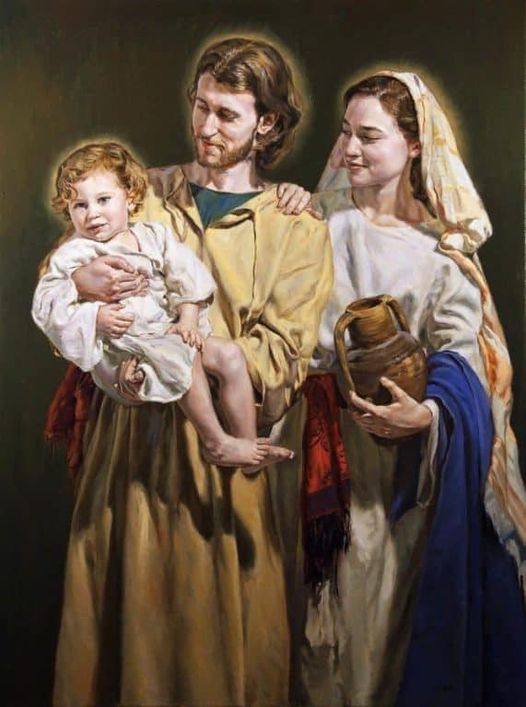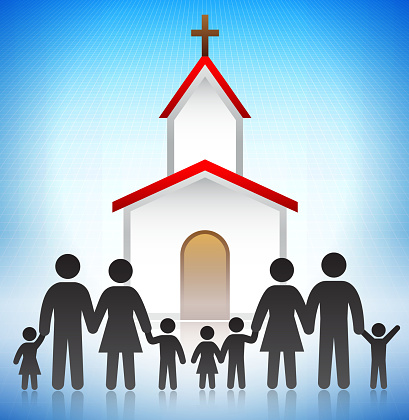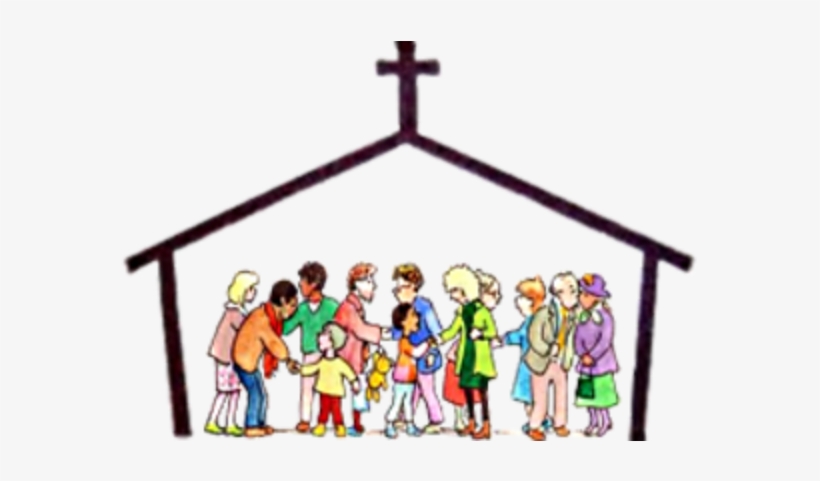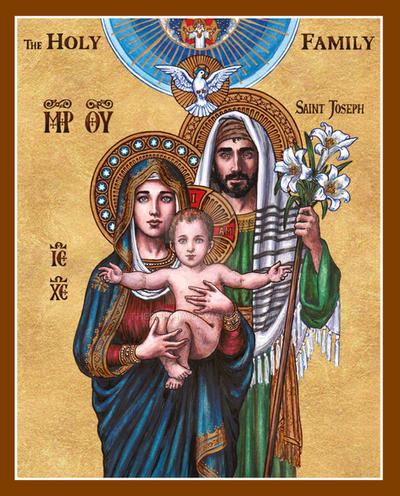Daily Saints – 31 December.
Feast of the Holy Family of Jesus, Mary and Joseph.

The Feast of the Holy Family of Jesus, Mary and Joseph is normally celebrated on the Sunday after Christmas. It’s observed on the Sunday after Christmas, or if Christmas falls on a Sunday, then it’s observed on December 30th instead.
This feast developed at the beginning of the 19th century in Canada and then spread to the entire Church in 1920. At first, it was celebrated on the Sunday after Epiphany. It was added to the liturgical calendar by Pope Benedict XV.
Pope Leo XIII promoted the observance of this feast with the hope that it might instill into Christian families something of the faithful love and the devoted attachment that characterize the family of Nazareth.
The primary purpose of the Church in instituting and promoting this feast is to present the Holy Family as the model and exemplar of all Christian families. The church portrays the Holy Family of Nazareth as the “true model of life” from which our families can draw inspiration and know where to find help and comfort.
The children must learn to see in their father the foster-father St. Joseph, and the Blessed Mother as the perfect model for their own mother. The lesson to be learned is both practical and theoretical, in that the children must learn how to obey and love their parents in thought, word and action, just as Christ was obedient to Mary and Joseph.
Marriage establishes a family, and its purpose is to increase the number of the elect, through the bodily and spiritual fecundity of the Christian spouses. Every marriage intends children. Although Mary and Joseph were not united in a carnal way, their marriage is a true marriage: an indissoluble, exclusive union, wholly subordinated to the child. Mary and Joseph are united only to bring Jesus into the world, to protect and raise him.
“The conjugal community is established upon the consent of the spouses. Marriage and the family are ordered for the good of the spouses and for the procreation and education of children. The love of the spouses and the begetting of children create among members of the same family personal relationships and primordial responsibilities.” – Catechism of the Catholic Church, 2201
“In creating man and woman, God instituted the human family and endowed it with its fundamental constitution. Its members are persons equal in dignity. For the common good of its members and of society, the family necessarily has manifold responsibilities, rights, and duties.” – Catechism of the Catholic Church, 2203
The purpose of every marriage is to establish a Christian family. The Holy Family observed the religious laws of Israel; it went on pilgrimage to Jerusalem every year with other Jewish families (Lk. 2:41). Jesus saddens and amazes his father and his mother because to their will and company, he prefers “to be in his Father’s house”. Thus, it may happen that God’s will obliges the family to make disconcerting sacrifices. Yet every Christian family must live in harmony and in prayer, which are the pledges of joy and union.
Jesus was God but He remained obedient to his parents. And through the fullness of grace, Mary stood above Joseph. Nevertheless — if we except the event in the Temple — Joseph remained the head of the family; he took the initiative (as when the Holy Family fled to Egypt), and in Nazareth Jesus obeyed his parents.
“Parents have the first responsibility for the education of their children. They bear witness to this responsibility first by creating a home where tenderness, forgiveness, respect, fidelity, and disinterested service are the rule. The home is well suited for education in the virtues. This requires an apprenticeship in self-denial, sound judgment, and self-mastery – the preconditions of all true freedom. Parents should teach their children to subordinate the “material and instinctual dimensions to interior and spiritual ones.” Parents have a grave responsibility to give a good example to their children. By knowing how to acknowledge their own failings to their children, parents will be better able to guide and correct them.” – Catechism of the Catholic Church, 2223
Today’s celebration demonstrates Christ’s humility and obedience to the fourth commandment, whilst also highlighting the loving care that His parents exercised in His keeping.
The liturgical feast of the Holy Family speaks to us of the fond and loving care that we must render to the Body of Christ. We can understand this in a mystical sense, as guardians of the Church, and also in the Eucharistic sense. Mary and Joseph took great care of Jesus’ physical body. Following their example, we can and must take great care of His Mystical Body, the Church, and the Eucharist which He has entrusted to us.
The Feast of the Holy Family is not just about the Holy Family, but about our own families too. Our family life becomes sanctified when we live the life of the Church within our homes. This is called the “domestic church” or the “church in miniature.”
St. John Chrysostom urged all Christians to make each home a “family church,” and in doing so, this sanctifies the family unit.
“The Christian family is a communion of persons, a sign and image of the communion of the Father and the Son in the Holy Spirit. In the procreation and education of children, it reflects the Father’s work of creation. It is called to partake of the prayer and sacrifice of Christ. Daily prayer and the reading of the Word of God strengthen it in charity. The Christian family has an evangelizing and missionary task.” – Catechism of the Catholic Church, 2205
“For every believer, and especially for Christian families, the humble dwelling place in Nazareth is an authentic school of the Gospel. Here we admire, and put into practice, the divine plan to make the family an intimate community of life and love; here we learn that every Christian family is called to be a small “domestic church” that must shine with the Gospel virtues. Recollection and prayer, mutual understanding and respect, personal discipline and community asceticism and a spirit of sacrifice, work and solidarity are typical features that make the family of Nazareth a model for every home.” – Pope John Paul II, Angelus, December 30, 2001
“Today, a few days after Christmas, the Church contemplates the Holy Family. At the school of Nazareth, every family learns to be a workshop of love, unity and openness to life. In our day a misunderstood sense of rights sometimes troubles the very nature of the family institution and of the conjugal bond. People who believe in the importance of the family based on marriage should join forces at all levels. The family is a human and divine reality that should be defended and promoted as a fundamental social good.” Pope John Paul II, Angelus, December 28, 2003
“Mary and Joseph taught Jesus primarily by their example: in his parents, he came to know the full beauty of faith, of love for God and for his Law, as well as the demands of justice, which is totally fulfilled in love (see Rom 13: 10). From them he learned that it is necessary first of all to do God’s will, and that the spiritual bond is worth more than the bond of kinship.” – Pope Benedict XVI, Angelus, St Peter’s Square, Sunday, 31 December 2006
“The Second Vatican Council dedicated much attention to the family. Married partners, it said, must be witnesses of faith to each other and to their children (see Lumen Gentium, no. 35). The Christian family thus shares in the Church’s prophetic vocation: with its way of living it “proclaims aloud both the present power of the Kingdom of God and the hope of the blessed life” (ibid.). Then, as my venerable Predecessor John Paul II tirelessly repeated, the good of the person and of society is closely connected to the “healthy state” of the family (see Gaudium et Spes, no. 47). The Church, therefore, is committed to defending and to fostering “the dignity and supremely sacred value of the married state” (ibid.).” – Pope Benedict XVI, Angelus, St Peter’s Square, Sunday, 30 December 2007
“Jesus willed to be born and to grow up in a human family; he had the Virgin Mary as his mother and Joseph who acted as his father; they raised and educated him with immense love. Jesus’ family truly deserves the title “Holy”, for it was fully engaged in the desire to do the will of God, incarnate in the adorable presence of Jesus. On the one hand, it was a family like all others and as such, it is a model of conjugal love, collaboration, sacrifice and entrustment to divine Providence, hard work and solidarity in short, of all those values that the family safeguards and promotes, making an important contribution to forming the fabric of every society. At the same time, however, the Family of Nazareth was unique, different from all other families because of its singular vocation linked to the mission of the Son of God.” – Pope Benedict XVI, Angelus, St Peter’s Square, Sunday, 28 December 2008
“The Christian family is aware that children are a gift and a project of God. Therefore, it cannot be considered that it possesses them; rather, in serving God’s plan through them, the family is called to educate them in the greatest freedom, which is precisely that of saying “yes” to God to do his will. The Virgin Mary is the perfect example of this “yes”. Let us entrust all families to her, praying in particular for their precious educational mission.” Pope Benedict XVI, Angelus, St Peter’s Square, Sunday, 27 December 2009
“Let us remember the three key words for living in peace and joy in the family: “may I”, “thank you” and “sorry”. In our family, when we are not intrusive and ask “may I”, in our family when we are not selfish and learn to say “thank you”, and when in a family one realizes he has done something wrong and knows how to say “sorry”, in that family there is peace and joy.” – Pope Francis, 29 December 2013, Angelus, St Peter’s Square
“Two elderly people, Simeon and Anna, moved by the Holy Spirit, approach and praise God for that Child, in whom they recognize the Messiah, the light of the people and the salvation of Israel (cf. Lk 2:22-38). It is a simple moment but rich with prophecy: the encounter between two young spouses full of joy and faith due to the grace of the Lord; and two elderly people also filled with joy and faith through the action of the Spirit. Who causes them to meet? Jesus. Jesus makes them meet: young and old. Jesus is He who brings generations closer. He is the font of that love which unites families and people, conquering all diffidence, all isolation, all distance.” Pope Francis, 28 December 2014, Angelus, St Peter’s Square
“At the end of that pilgrimage, Jesus returned to Nazareth and was obedient to his parents (cf. Lk 2:51). This image also contains a beautiful teaching about our families. A pilgrimage does not end when we arrive at our destination, but when we return home and resume our everyday lives, putting into practice the spiritual fruits of our experience.” – Pope Francis, Vatican Basilica, Sunday, 27 December 2015
“Forgiveness is the essence of love which can understand mistakes and mend them. How miserable we would be if God did not forgive us! Within the family, we learn how to forgive, because we are certain that we are understood and supported, whatever the mistakes we make. Let us not lose confidence in the family! It is beautiful when we can always open our hearts to one another, and hide nothing. Where there is love, there is also understanding and forgiveness.” – Pope Francis, Vatican Basilica, Sunday, 27 December 2015

“Each time that families — even those that are wounded and marked by frailty, failures and difficulties — return to the source of the Christian experience, new roads and unexpected opportunities open.” – Pope Francis, 31 December 2017, Angelus, St Peter’s Square
“When there are problems in families, we take for granted that we are right and we close the door to others. Instead, it is important to think: ‘What is good about this person?’, and to be astonished by this ‘good’. And this helps family unity. If you have problems in the family, think about the good things in the family member with whom you have problems, and be astonished by this. This will help to heal familial wounds.” – Pope Francis, 30 December 2018, Angelus, St Peter’s Square
“It is true, in every family there are problems, and at times arguments. “And, Father, I argued…” but we are human, we are weak, and we all quarrel within the family at times. I would like to say something to you: if you quarrel with the family, do not end the day without making peace. “Yes, I quarreled”, but before the end of the day, make peace. And do you know why? Because cold war, day after day, is extremely dangerous. It does not help. And then, in the family there are three words, three phrases that must always be held dear: “Please”, “Thank you”, and “I am sorry”. “Please”, so as not to be intrusive in the life of others. Please: may I do something? Is it alright with you if I do this? Please. Always, so as not to be intrusive. Please, the first word. “Thank you”: so much help, so much service is granted to us in the family: always say thank you. Gratitude is the lifeblood of the noble soul. “Thank you”. And then, the hardest to say: “I am sorry”. Because we always do bad things and very often someone is offended by this: “I am sorry”, “I am sorry”. Do not forget the three words: “please”, “thank you”, and “I am sorry”. If in a family, in the family environment, there are these three words, the family is fine.” – Pope Francis, 27 December 2020, Angelus, Library of the Apostolic Palace
“What was family life in Nazareth like? In the home of the Holy Family in Nazareth, Jesus, Mary and Joseph sanctified their ordinary life, without doing anything spectacular or newsworthy. They led a life that was to all appearances, the same as that of their neighbours, a life that was important, not because of the material things they did but because of the love that they put into these things, in perfect union with the Will of God the Father.” – St. Josemaria Escriva
“If you want to bring happiness to the whole world, go home and love your family.” – St. Teresa of Calcutta
“A senior Judge of the Supreme Court recently congratulated the bride and groom on marriage and gave them a pertinent piece of advice: “See that you never convert your family into a courtroom; instead let it be a confessional. If the husband and wife start arguing like attorneys in an attempt to justify their behavior, their family becomes a court of law and nobody wins. On the other hand, if the husband and the wife — as in a confessional — are ready to admit their faults and try to correct them, the family becomes a Heavenly one.” – Fr. Tony Kadavil

Prayer:
“JESUS, Son of God and Son of Mary, bless our family. Graciously inspire in us the unity, peace, and mutual love that you found in your own family in the little town of Nazareth.
MARY, Mother of Jesus and Our Mother, nourish our family with your faith and your love. Keep us close to your Son, Jesus, in all our sorrows and joys.
JOSEPH, Foster-father to Jesus, guardian and spouse of Mary, keep our family safe from harm. Help us in all times of discouragement or anxiety.
HOLY FAMILY OF NAZARETH, make our family one with you. Help us to be instruments of peace. Grant that love, strengthened by grace, may prove mightier than all the weaknesses and trials through which our families sometimes pass. May we always have God at the center of our hearts and homes until we are all one family, happy and at peace in our true home with you. Amen.”
Consecration of the Family to the Holy Family:
“O Lord Jesus, you lived in the home of Mary and Joseph in Nazareth. There you grew in age, wisdom and grace as you prepared to fulfill your mission as our Redeemer. We entrust our family to you.
O Blessed Mary, you are the Mother of our Savior. At Nazareth, you cared for Jesus and nurtured him in the peace and joy of your home. We entrust our family to you.
O Saint Joseph, you provided a secure and loving home for Jesus and Mary, and gave us a model of fatherhood while showing us the dignity of work. We entrust our family to you.
Holy Family, we consecrate ourselves and our family to you. May we be completely united in a love that is lasting, faithful and open to the gift of new life. Help us to grow in virtue, to forgive one another from our hearts, and to live in peace all our days.

Keep us strong in faith, persevering in prayer, diligent in our work, and generous toward those in need. Our home, O Holy Family, truly becomes a domestic church where we reflect your example in our daily lives. Amen.”
Paul Kvc

